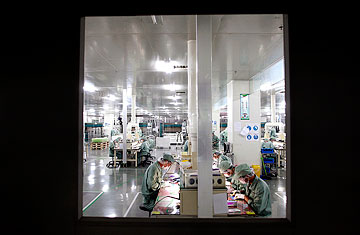
Light show Assembling photovoltaic panels in Wuxi. China's solar-power industry, the world's biggest, is generating excess capacity
Updated: Jun. 12, 2012
In the Chinese industrial city of Yiwu, it's Christmas year-round. But entrepreneur Kevin Luo isn't in a festive mood. Roughly half the world's Christmas decorations — from plastic trees to red Santa caps — are produced by some 500 manufacturers in Yiwu. At a noisy facility outside the city center, Luo, 28, churns out 130 million shiny ornaments a year. A changing Chinese economy, however, is making it more and more difficult for his firm, the Yiwu Shuangyuan Christmas Arts & Crafts Factory, to stay alive.
Luo's business, like all the Christmas manufacturers in Yiwu, thrived on China's cheap labor, but those days are gone. The average wage for a shop-floor worker in the industry jumped 30% in 2011, to about $350 a month. Though he has replaced some workers with machines to cut costs, there is a limit to how much he can automate. The final step of painting some of the ornaments is still completed by teams of young women. Unable to pass more than a fraction of his rising costs on to his price-conscious customers, Luo has seen his profit margins squeezed thin — and he has become grimmer than the Grinch. "I don't think the Christmas industry can survive in China," he says.
To many shoppers around the world, accustomed to seeing Walmart shelves stuffed with cheap wares from China, Luo's prediction might come as a shock. But after three decades of madcap development, the Chinese economy that became famous for Christmas toys and other trinkets is not the same Chinese economy that exists today. The flood of eager, poor peasants from the countryside who once filled Yiwu's assembly lines has dwindled to a trickle. With so many opportunities back home in the hinterland, they have little incentive to seek out strenuous factory jobs in Yiwu. "It is significantly more difficult to get workers," says Chen Jinlin, secretary general of the Yiwu Christmas Products Industry Association. "The whole society is changing."
Shifting Gears
For the past three decades, China has been propelled by a powerful concoction of cost advantages, massive investment and state support, transforming the destitute nation into the world's second largest economy and chief rival to the U.S.'s economic dominance. While nearly every corner of the planet was hammered during the Great Recession, China brushed off the financial crisis with ease. Such success has led many businesspeople and economists to conclude that Beijing's "state capitalism" — which mixes the invisible hand of the market with the very visible hand of the state — is superior to the free-enterprise systems of the West. As China has advanced, so has its importance to the global economy. Chinese factories sit at the center of a regional manufacturing network that has held up growth throughout Asia. The nation's wealthier consumers are ever more critical to multinationals, from General Motors to McDonald's. And China's voracious appetite for iron ore, corn and other commodities has sparked a boom in prices. If not for China, the Great Recession would have been even more debilitating for the world.
Yet China's famed growth machine is beginning to sputter. The rising costs eating away at Yiwu's competitiveness are only one problem. Excessive state control is creating potentially lethal distortions in the economy. Willy-nilly investment is threatening the health of the financial system. State firms are crowding out the entrepreneurial private sector. The hard truth is that China needs a new growth model, driven more by the market than the state and more balanced, open and fair. Otherwise the consequences could be severe. Robert Zoellick, the departing president of the World Bank, called China's current system "unsustainable." In a February report, the bank warned that by foot-dragging on reform, China could "risk the possibility of an economic crisis in the future."
The need for change is clear. China's economy is experiencing its most serious downturn in many years. The IMF predicts GDP will grow 8.2% in 2012 — not bad given the global climate but still the slowest rate since 1999. And China isn't alone. Once robust emerging markets everywhere are beginning to cool off. Brazil's economy is expected to advance a mere 3% in 2012, while India, plagued by political paralysis, just posted its worst quarterly growth rate since 2004. With the U.S. recovery sputtering and the European debt crisis back on the boil because of fears of a Greek exit from the euro zone, the slowdown in China and other developing economies is something the world can ill afford.
